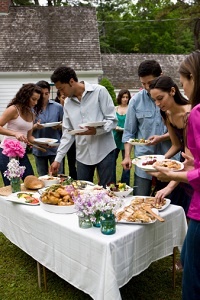Outdoor events can present different challenges and require unique preparations, as compared to events held indoors. In addition to the standard event planning considerations, keep the following in mind when planning your catered, outdoor event:
Weather
Weather is likely the most important factor when considering hosting an outdoor event. Extremes of all types can ruin your outdoor event plans – rain, wind and extreme temperatures can all dictate the success of your outdoor event. One piece of advice you'll often hear is, "be prepared for bad weather," but, what exactly does this mean? We'd recommend preparing for the worst.
Monitor weather forecasts far in advance – typically 10 days prior. This should give you a general idea of potential weather conditions during your outdoor event. Remember that tents and umbrellas are useful for both rain and sun protection. Always make sure décor and furnishings are properly anchored in the event of a particularly blustery day. Be particular when choosing outdoor furniture for your event – for example, metal chairs heat up quickly under the sun, and cushioned chairs don't fair well when exposed to rain.
Electricity
Large amounts of electricity are required to keep food, entertainment and lighting up and running. If improperly heated or cooled, catered food can easily spoil, leading to health concerns for guests. Entertainment such as a band or DJ might require a separate power source to keep their equipment up and running. For events that run into the afternoon or evening, light sources may be needed to keep the event properly lit. Confirm that your available power sources can easily service your outdoor event. Always have a back-up plan – make sure power generators are on standby in the event of a power outage or overload.
Safety
Keep generators, hot plates, and other potentially dangerous equipment away from children and guests. It's not a bad idea to have a "staff only" area that's off-limits to guests. Not only can this area be used to keep potentially hazardous equipment away from guests, but it can also be used as a break area to keep staff adequately rested.
It's also wise to keep on-site emergency equipment, such as a first-aid kit, or fire extinguisher. Also, keeping local emergency contact information on-hand is never a bad idea.
Guest Comfort & Outdoor Obstacles
Guest comfort is one of the most important factors to plan for when hosting an event. Ensure that your guests enjoy their time spent at your event by considering the following:
• Provide a food option the majority of guests will enjoy. Also provide for any known or anticipated food allergies, intolerance and other dietary needs.
• Ensure restroom facilities are conveniently located and sufficiently stocked with supplies.
• Depending on the season, provide bug spray, sunscreen, hand sanitizer, fans, heaters, light blankets, and water to keep guests comfortable during extended outdoor events.
• Have multiple accessibility options available for guests with mobility issues.
• Consider the environment when planning an outdoor event – key features, such as a stage, should be positioned with your guests in mind.
• When possible, place guests with their backs to the sun for maximum visibility and comfort.


